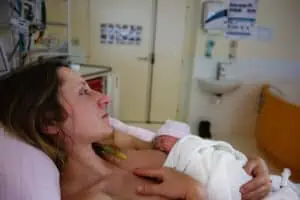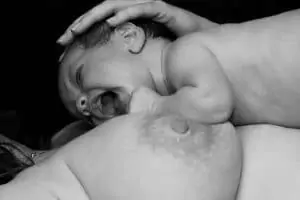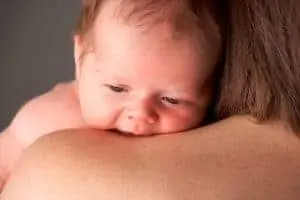Do you suddenly feel as if you can’t stop eating? Are you guzzling bottles of water like you were stranded on an island? Welcome to the world of breastfeeding that makes you hungrier and thirsty all the time.
When I had my first child, I felt like I was always starving. My husband kept bringing me snacks and meals, but I ate more than I ever did during that time frame. I repeatedly refilled my glass with water and wondered if something was wrong with me.
Did childbirth cause some weird reaction? Was I diabetic – I knew that could increase my thirst level.
No! It turns out that women often feel as if they’re always hungry while breastfeeding. Breastfeeding burns more calories and depletes your hydration faster, but don’t worry if you add extra calories. Your body needs those to create more breast milk for your baby.
Here’s what’s happening inside your body and why breastfeeding makes you hungry and thirsty.
Why Does Breastfeeding Make Me Hungry?
It takes energy and calories for your body to create breast milk for your baby. Some experts believe it takes up to 25% of your body’s energy to feed your baby daily. That means breastfeeding is a serious workout for your body.
Not only does your body need to create all of the milk needed to sustain your baby’s life, but it’s working hard on all the life-sustaining functions you require. A woman’s body is wonderful; the ability to maintain a life with your body is awe-inspiring, yet it exists for the mother.
It’s no wonder that you’re starving while breastfeeding! A lot is happening inside of your body.

Unfortunately, our culture has a negative view of women’s bodies, making you feel as if your breastfeeding appetite is negative. We live in a world that focuses heavily on dieting and using unhealthy methods to reach a “healthy” weight goal.
Women are held to arbitrary beauty standards, so when you find yourself hungry all the while breastfeeding, it can be worrisome.
Hunger isn’t a bad thing. Having an increased breastfeeding appetite means your body works hard to provide for your child, and it needs more nutrients and energy to sustain two lives. Don’t focus too much on overeating while breastfeeding.
Breastfeeding can make you tired and sleepy as well. Here is how to fight against it.
How Many Calories Does Breastfeeding Burn?
One of the most common questions women have is how many calories breastfeeding burns. Does it mean that you can skip exercising for a while?
Believe it or not, breastfeeding burns up to 1,000 calories per day. The amount of calories burned depends on how much milk you produce, so it will vary.
Let’s think of this another way.
Burning 1,000 calories is equivalent to running one-mile every 10 minutes for 10 miles. It’s equal to an hour of high-impact aerobics. Breastfeeding may not feel like an intense workout, but your body uses the same amount of energy to make breast milk for your child.
No wonder you feel like you’re starving while breastfeeding – your body is seriously working out!
Do You Need to Eat More While Breastfeeding?
Since your body burns many calories, experts suggest that nursing mothers add between 300 and 500 additional calories daily. That should put you in a healthy range of 1,800 to 2,200 calories per day.
Some doctors disagree with the 500 extra calories, suggesting that some mothers need to eat even more than this. Every woman’s needs are different based on how many times she nurses and if she’s pumping, along with her activity level. If you’re constantly hungry while breastfeeding and not just overindulging in food cravings while breastfeeding, chances are your body is telling you it needs more calories.
It’s crucial that you don’t dip below 1,500 calories per day. At that point, your milk supply will take a hit, and your body will decrease your supply.
Your nutritional level is individual, especially while lactating. You could reduce your extra calories if you have additional fat reserves and want to lose weight. Mothers with an exceptionally active lifestyle or who enjoy exercising while breastfeeding may need to eat more to keep up with the caloric demands.
How to Handle Your Breastfeeding Appetite
Understanding your postpartum hunger and listening to your body’s needs might be hard at first, and you might worry about how much you eat. Keep your mind on intentionally caring for your body and your baby; meeting the increased nutritional needs is part of that goal.
Here are some suggestions.
Remind Yourself to Eat
I remember feeling as if I was starving while breastfeeding one day, and the next day, I forgot to eat for hours because of a busy day. When I realized I didn’t eat, I ate unhealthy foods that made me feel gross afterward.
The increased energy output during breastfeeding means your body needs regular and consistent fuel. Maintaining a healthy eating schedule stabilizes your blood sugar, which also helps your mood and energy levels.
Aim to eat every 2-3 hours per day. That doesn’t mean you need full meals every 2-3 hours. The goal is to have three main meals per day and healthy snacks in between those meals.
If you find yourself skipping meals frequently, set reminders on your phone.
Eat Sustaining Meals and Snacks
Breastfeeding hunger is real; one way to combat that is to eat meals and snacks filling you up. Picks snacks that are a combination of protein, complex carbohydrates, and healthy fats.
Instead of eating one food, eating a mix of foods help you meet your needs better. When you create meals, make sure you have a source for each.
Keep Easy Breastfeeding Snacks on Hand
You’ll reach for unhealthy snacks if you don’t keep healthy breastfeeding snacks on hand. It’s best to be prepared with nourishing, easy snacks rather than getting a candy bar. You don’t want to indulge in too many unhealthy food cravings while breastfeeding.
Some easy and healthy breastfeeding snacks include:
- Trail Mix
- Protein Bars
- Fresh Fruit
- Fresh Vegetables with Dip
- Dried Fruit
- Crackers and Cheese
- Granola and Yogurt
- Beef Jerky
- Hummus with Veggies or Crackers
Avoid Postpartum Dieting
Some women might think they need to decrease their breastfeeding hunger by dieting to lose their baby weight, but dieting can be problematic, especially while nursing. Dieting cuts out food groups and reduces your calorie level below the needed level for breast milk production.
Postpartum diets lead to a higher risk of nutrient deficiencies that increase the risk of postpartum depression and reduce milk supply.
Does Breastfeeding Dehydrate You?
If you are wondering if breastfeeding makes you thirsty, moms all agree that it does. You experience an increased appetite while breastfeeding, and you’ll also feel thirstier.
Note that:
Part of your increased thirst has to do with hormones in your body. Breastfeeding causes the release of oxytocin, which you might know as the love hormone. It does more than just make you feel happy. Oxytocin raises your body temperature, so you feel hot while breastfeeding. It also makes you feel thirsty.
You have hormones at play, and breast milk is nearly 90% water. So, your body requires more fluids to properly hydrate your body while also producing an adequate amount of breast milk. Fluids are quickly lost while your baby nurses. That’s why you always feel thirsty; you constantly battle to stay balanced and hydrated.
Does Drinking Water Increase Breast Milk?
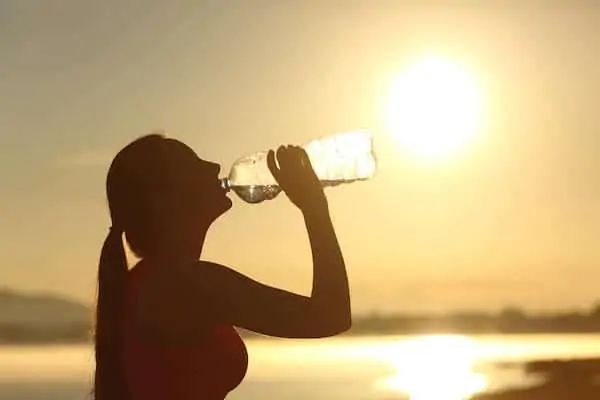
Many myths surround drinking water and breast milk. One of those myths is that drinking more water increases your breast milk supply or boosts it.
It would be nice if that’s true, but that’s not how the milk supply works. You can’t drink more ounces to create more breast milk.
While drinking too little water decreases breast milk production (your body needs to use the water to create the milk), drinking even more doesn’t mean your body will turn that into milk because it’s there. Your body makes the milk your baby demands and excretes the rest of the unneeded fluid.
Can Drink Too Much Water Dilute Breast Milk?
Breast milk is not like urine; drinking too much water isn’t going to have the opposite effect. Drink as much water as you want.
The best advice is to drink to thirst while breastfeeding. If you’re thirsty, drink more water. If you don’t feel thirsty, don’t drink.
How Much Water Should I Drink While Breastfeeding?
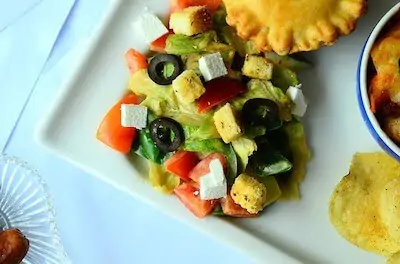
The average recommendation is to drink eight to ten 8-ounce servings of water per day. That doesn’t have to be plain water; tea, coffee, and other water-based liquids also count. Suggested drinks while breastfeeding include:
- Milk or milk substitutes
- Decaffeinated coffee and teas (limit caffeinated teas and coffee while breastfeeding)
- Fruit or vegetable juices
- Fruits, such as oranges or watermelon
- Soups
The proper amount of water to drink does vary for every woman. Some doctors suggest you need even more than eight to ten glasses. If you want to be cautious, drink the same amount of water you did during pregnancy and the average amount of fluids you lose each day while breastfeeding. That’s typically another 24 ounces.
To round it out, you should drink between 64 and 104 ounces of water daily.
It’s Okay to be Hungry!
Breastfeeding mothers output a lot of energy to feed their babies, so if you feel hungry while breastfeeding, that’s normal. If you feel thirsty all the time, that’s normal as well. Listen to your body, and follow the cues to help keep your body nourished and hydrated during this time.
Hey, this is Linda. My biggest accomplishment in life is being a mother of four children. Their current ages range from almost ten years old down to 20 months old.
I’m passionate about writing parenting articles because I understand so well all of the problems and trials you face as a parent. From breastfeeding woes to budgeting problems and behavior problems, along with everything in between, chances are I’ve faced it over the last ten years. Read more about Linda here.



